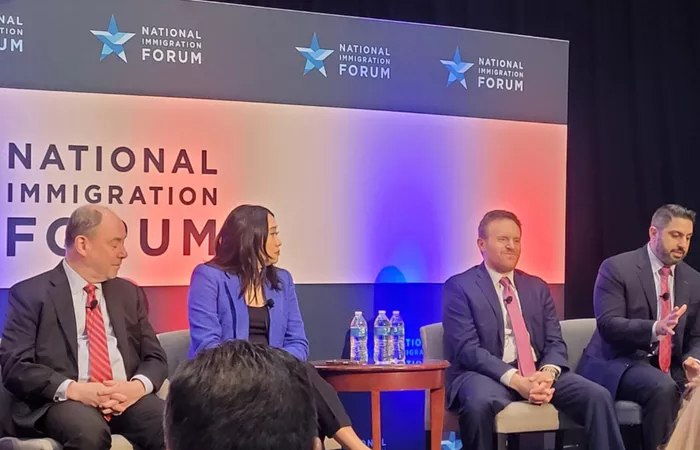WASHINGTON, D.C. — During his visit to Washington on Wednesday, President-elect Donald Trump met with congressional Republicans while economic leaders gathered nearby with a clear message: a strong economy cannot be achieved without robust immigration policies.
Trump’s presidential campaign, which culminated in his victory on November 5, largely focused on immigration reform and criticizing the economy under Democratic President Joe Biden. However, at an event organized by the National Immigration Forum, prominent Republican economists argued that immigration and economic growth are closely linked, but not in the way Trump’s campaign suggested.
“You can’t be America First by putting immigration last,” said Douglas Holtz-Eakin, a former White House economist under President George H.W. Bush and chief economic advisor to Senator John McCain’s 2008 campaign. “The numbers just don’t add up.”
Holtz-Eakin and other experts emphasized that with fewer children entering American schools, the nation needs immigration to strengthen its workforce and sustain economic growth.
“Anyone who is arithmetically informed knows immigration is central to our future,” Holtz-Eakin added. “Native-born Americans have such low fertility rates that without immigration, the U.S. could face a future like Japan — older and smaller, with declining economic vitality.”
Trump campaigned on promises of mass deportations of undocumented immigrants, but Jon Baselice, vice president for immigration policy at the U.S. Chamber of Commerce, warned that such a plan may be unrealistic.
“With the resources available, setting expectations realistically is crucial,” Baselice said. “Attempting mass deportations in a short period is likely to fail.”
The economic consequences of a lack of immigrants are already evident. According to the Pennsylvania Chamber of Commerce, employers have expressed growing concern about a shortage of workers over the past decade. Alex Halper, vice president for governmental affairs, pointed out that while Pennsylvania has seen historically small kindergarten classes in recent years, the state’s older population continues to grow, with many job openings going unfilled.
“We simply don’t have the people to fill positions for Pennsylvania employers,” Halper said.
Immigrants are especially vital in the tech industry. Pearl Chang Esau, CEO of Shàn Strategies, a company that advises businesses on their economic and environmental impact, highlighted the importance of “Dreamers” — young immigrants who arrived in the U.S. as children and are allowed to stay under a program introduced by former President Barack Obama.
“Thirty percent of Dreamers in college are pursuing STEM degrees but cannot work,” Esau explained. “We must integrate this talent into our workforce.”
Despite Trump’s anti-immigration platform, many at the event expressed concern about the future. Jennie Murray, president and CEO of the National Immigration Forum, acknowledged the challenges ahead.
“We sense a giant mountain that lies before us,” Murray said.
U.S. Rep. Tom Suozzi, D-N.Y., expressed hope that a coalition of business leaders, law enforcement, and faith organizations could push for bipartisan solutions. He emphasized that public polling shows overwhelming support for comprehensive immigration reform.
“Anybody who says, ‘Why don’t you just…’ doesn’t know what they’re talking about,” Suozzi said, to applause from the audience.
This push for a balanced approach to immigration reflects growing concerns about the country’s future economic stability.
Related topics:
- Immigrant Advocates Urge Biden: ‘Act Now to Address Urgent Crisis’
- Deported Immigrant Vows to Continue Supporting Trump, No Matter What
- How Federal Immigration Restrictions Will Slow Winnipeg’s Population Growth: Economic Outlook


